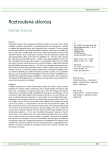Failure of pharmacological antiepileptic treatment
Authors:
V. Donáth
Authors‘ workplace:
Banská Bystrica
; II. neurologická klinika SZU FNsP F. D. Roosevelta
Published in:
Cesk Slov Neurol N 2008; 71/104(2): 134-138
Category:
Review Article
Overview
The treatment of epilepsy is a challenging process. Correct diagnosis, accurate classification of epileptic seizures and epilepsies, and adequate selection of the antiepileptic alone are not a guarantee of a successful treatment. There are always patients who do not meet the expectations associated with pharmacological antiepileptic treatment. Failure to attain the expected effect of treatment is most often due to the following reasons: wrong diagnosis of epilepsy, wrong drug selection for the specific type of epileptic seizure, underdosing of the antiepileptic drug, insufficient absorption of the drug or its rapid metabolism, worsening of epileptic seizures after antiepileptic treatment, pseudoseizures and real epilepsy at the same time, progression of the underlying metabolic, toxic, cancerous or degenerative brain disease, toxicity of the antiepileptic drug, non-compliance of the patient, and pharmacoresistant epilepsy.
Key words:
epilepsy - failure of treatment of epilepsy – antiepileptic treatment – epileptic seizure – pharmacoresistant epilepsy
Sources
1. Brodie MJ, Leach JP. Success or failure with antiepileptic drug therapy: Beyond empiricizm? Neurology 2003; 60 : 162–163.
2. Kwan P, Brodie MJ. Effectiveness of first antiepileptic drug. Epilepsia 2001; 42 : 1255–1260.
3. Genton P, McMenamin J. Summary. Aggravation of seizures by antiepileptic drugs: what to do in clinical practice. Epilepsia 1998; 39(Suppl 3): S26 –S29.
4. Perucca E, Gram L, Avanzini G, Dulac O. Antiepileptic drugs as a cause of worsening seizures. Epilepsia 1998; 39 : 5–17.
5. Donáth V. Iatrogénna problematika antiepileptík. Neurologie pro praxi 2003; 3 : 116–120.
6. Sýkora P, Sýkora J. Môžu antiepileptiká zhoršiť priebeh epilepsie? Farm obzor 1999; 68 : 219 –222.
7. Ošlejšková H. Zhoršování epileptických záchvatů a epilepsií antiepileptiky – je to možné? Cesk Slov Neurol N 2007; 2 : 137–142.
8. Jain KK. Sytemic lupus erythematosus (SLE)-like syndromes associated with carbamazepine therapy. Drug Saf 1991; 6 : 350 –360.
9. Aarli JA. Immunological aspects of epilepsy. Brain Dev 1993;15 : 41–49.
10. Bell WL, Crawford IL, Shiu GK. Reduced bioavailability of moisture-exposed carbamazepine resulting in status epilepticus. Epilepsia 1993; 34 : 1102 –1104.
11. Perucca E. Overtreatment in epilepsy: adverse consequences and mechanisms. Epilepsy Res 2002; 52 : 25–33.
12. Temkin NR. Antiepileptogenesis and seizure prevention trials with antiepileptic drugs: meta-analysis of controlled trials. Epilepsia 2001; 42 : 515–524.
13. Biton V, Edwards KR, Montouris GD et al. Topiramate titration and tolerability. Ann Pharmacother 2001; 35 : 173–179.
14. Richens A, Davidson DL, Cartlidge NEF, Easter DJ. A multicentre comparative trial of sodium valproate and carbamazepine in adult onset epilepsy. Adult EPITEG Collaborative Group. J Neurol Neurosurg Psychiatry 1994; 57 : 682–687.
15. Perucca E, Dulac O, Shorvon S, Tomson T. Harnessing the clinical potential of antiepileptic drug therapy: dosage optimisation. CNS Drugs 2001; 15 : 609–621.
16. Chadwick, DW. Overuse of monitoring of blood concentrations of antiepileptic drugs. Br Med J 1987; 294 : 723–724.
17. Kwan P, Brodie MJ. Early identification of refractory epilepsy. N Engl J Med 2000; 342 : 314–319.
18. Patsalos P, Fröscher W, Pisani F, van Rijn CM. The importance of drug interactions in epilepsy therapy. Epilepsia 2002; 43 : 365–385.
19. Besag FM, Berry DJ, Pool F, Newbery JE, Subel KB. Carbamazepine toxicity with lamotrigine: pharmacokinetic or pharmacodynamic interaction? Epilepsia 1998; 39 : 183–187.
20. Brázdil M, Hadač J, Marusič P a kol. Farmakorezistentní epilepsie. Praha: Triton 2004.
21. Engel J jr. Intractable epilepsy: definition and neurobiology. Epilepsia 2001; 42(Suppl 6): 3.
22. Löscher W, Potschka H. Role of multidrug transporters in pharmacoresistance to antiepileptic drugs. J Pharmacol Exp Ther 2002; 301 : 7–14.
23. Sazgar M, Bourgeois BF. Aggravation of epilepsy by antiepileptic drugs. Pediatr Neurol 2005; 33 : 227–234.
Labels
Paediatric neurology Neurosurgery NeurologyArticle was published in
Czech and Slovak Neurology and Neurosurgery

2008 Issue 2
- Memantine Eases Daily Life for Patients and Caregivers
- Possibilities of Using Metamizole in the Treatment of Acute Primary Headaches
- Metamizole at a Glance and in Practice – Effective Non-Opioid Analgesic for All Ages
- Memantine in Dementia Therapy – Current Findings and Possible Future Applications
- Advances in the Treatment of Myasthenia Gravis on the Horizon
-
All articles in this issue
- Multiple sclerosis
- Failure of pharmacological antiepileptic treatment
- Pathophysiology of conduction block in neuromuscular diseases
- Woman and ictus
- Diagnosis of hyponatraemia in neurointensive care: the role of renal function parameters
- The Pitfalls of Diagnosis and Treatment of Flexion Distraction Injuries of the Thoracic and Lumbar Spine: a Prospective Study
- Effect of endoscopic and classic surgery for carpal tunnel syndrom
- Mild controlled hypothermia – a neuroprotective method for late ischaemic complications in resuscitation care for patients with severe spontaneous subarachnoid hemorrhage caused by aneurism rupture
- Intracranial angioplasty and stent implantation in atherosclerotic lesions
- Familial aggregation of Parkinson’s disease: a genealogical study
- PCR Detection of Herpes Viruses in Patients with Acute „Idiopathic“ Facial Paresis
- Treatment Results of Low-Grade Gliomas in Children (a Retrospective Data Analysis)
- Hemangioblastoma and its treatment using Leksell Gamma Knife
- Smith-Magenis syndrome: a case report
- Czech and Slovak Neurology and Neurosurgery
- Journal archive
- Current issue
- About the journal
Most read in this issue
- Multiple sclerosis
- Hemangioblastoma and its treatment using Leksell Gamma Knife
- Smith-Magenis syndrome: a case report
- Treatment Results of Low-Grade Gliomas in Children (a Retrospective Data Analysis)
